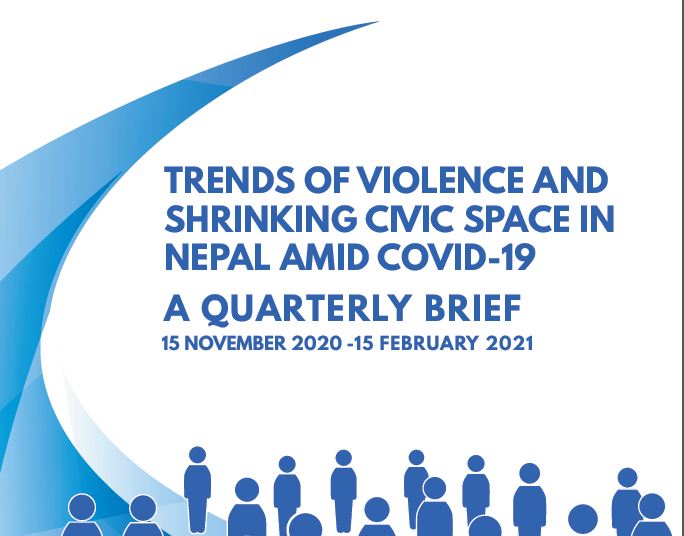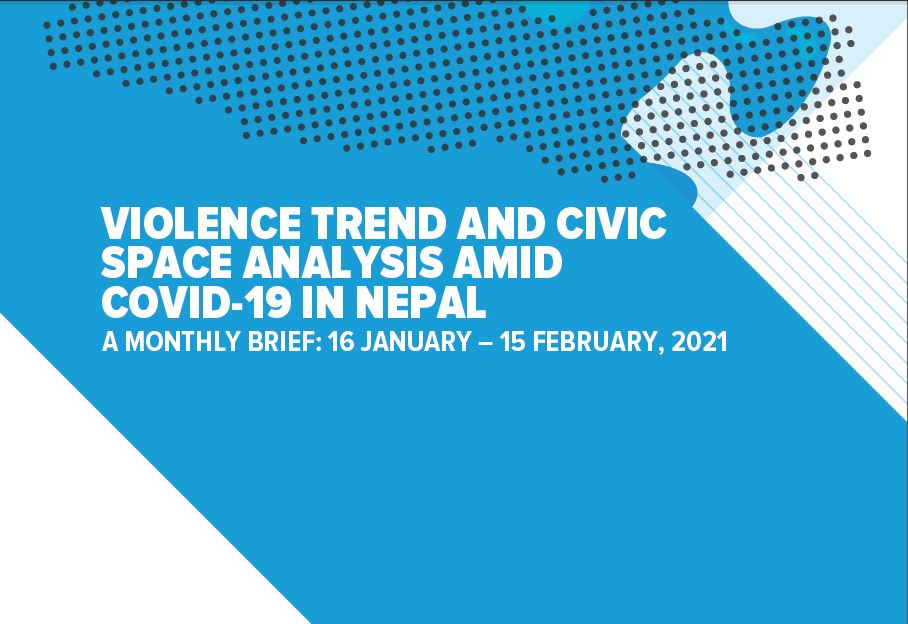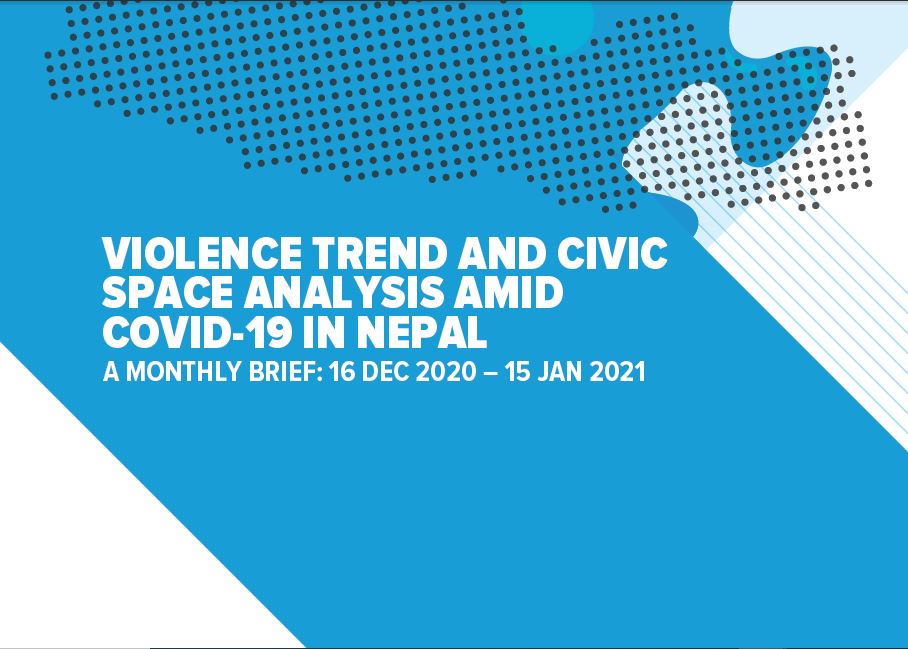Incident Reports
Tarai communities more prone to abuse and torture in police custody, report says
2019-06-26
Nepal
Towards the end of August last year, Ram Manohar Yadav was arrested from Gulariya in Bardiya for displaying black flags in protest against Deputy Prime Minister Upendra Yadav. Ten days later, Yadav’s family was told that he had died in police custody. While police maintained that Yadav had preexisting health conditions that led to his death, his family, friends and rights activists argued that mistreatment in prison was the real cause. Yadav’s wife Sunita has alleged that her husband was tortured to death.
Sunita Yadav’s allegation might not be implausible, as a new report says that people from ethnic communities in the Tarai are more prone to torture and misbehaviour from the police. While overall torture rates in detention centres across the country have risen sharply, Tarai communities, primarily Madhesis and Tharus, are facing the brunt of punishment, according to the report by Advocacy Forum, a human rights organisation.
Among the 1,165 detainees--from six districts, interviewed in 2018--22.2 percent said they were mistreated by security forces. On average, torture rates have been increasing at one percent annually since 2015, when 17.5 percent of the detainees had reported abuse at the hands of the police, according to the report.
But the study, carried out in prisons in Kathmandu, Banke, Rupandehi, Kaski, Kanchanpur and Morang districts, shows that detainees from ethnic communities in the Tarai reported markedly more torture and misbehaviour. According to the report, 30.4 percent of such detainees from the plains reported abuse, 8.2 percent higher than the average.
Recently, in a telling example of how security forces mistreat members of marginalised communities, Resham Chaudhary, currently in custody for murder during the 2015 Kailali protests, was shackled to his bed while receiving medical treatment at Bir Hospital. Once photos of his shackling went viral on social media, rights activists pointed to the differential treatment he was receiving, possibly because of his Tharu identity. His chain was subsequently removed on orders from the prime minister.
In the report, members of the ‘upper castes’ described the least number of such incidents while those from the ‘lower castes’ reported otherwise. Only 1.7 percent of Brahmins complained of abuse while 30.5 percent of Dalits alleged the same.
Females too said they were mistreated at higher rates in detention, with 23.1 percent alleging abuse, even though their numbers were considerably lower.
Police tend to behave differently with those who’re from privileged families than those less well-off and marginalised communities, said the researchers behind the report.
“Treatment in detention centres depends on how privileged a detainee is. The treatment was found to be different even if two people were facing the same charge," Bikash Basnet, programme officer at Advocacy Forum, told the Post.
According to the report, abuse and misbehaviour consisted of slapping, kicking, punching, hair pulling, and beating with plastic or bamboo sticks, while torture methods employed by the security forces include waterboarding.
Ever since 2001, the year the Forum started collecting data on misbehaviour in police custody, there has been a significant decrease in torture, from a peak of 53.4 percent in 2002 during the height of the Maoist insurgency to a low of 16.2 percent in 2014.
Anup Raj Sharma, chairperson of the National Human Rights Commission, said that the portrait painted by the report is bleak.
“Despite great political changes in the country, the attitude of the state machinery has remained the same,” said Sharma at a programme organised to launch the report. “The human rights commission has also received such reports. This is worrisome.”
The authority to look into such cases of abuse rests with the human rights commission and the attorney general’s office, but both organisations remain ineffective, say human rights activists. The human rights commission can only make recommendations, most of which remain unimplemented, while the attorney general’s office does not take proactive measures on its own, they said.
Basnet said a separate law and investigative entity are required to look into cases of torture. "In many cases, police refuse to register a first information report against officials involved in such illegal conduct," he said.
The Criminal Code that came into effect last year has set a penalty of maximum five years imprisonment and Rs 50,000 in fines for those convicted of torture. This law, however, lacks retroactive jurisdiction, which is required to deal with thousands of torture cases during the 10-year insurgency. Though the government registered an Anti-Torture Bill in Parliament in 2014, it remains unapproved.
The National Human Rights Commission had initiated an investigation into Ram Manohar Yadav’s death, but the report has not been made public. Even as the family alleges misbehaviour and custodial torture, Yadav’s death remains resolved.
Related Reports
Human Rights / Mahottari
Woman subjected to assault and inhumane treatment on witchcraft allegation in Mahottari
Human Rights / Sankhuwasabha
Two killed in prison in Sankhuwasabha: Seven inmates taken into custody for investigation
Interpersonal Violence / Kanchanpur
Inmate being subjected to physical assault and threat in prison accuses family members
Human Rights / Bara
Woman subjected to assault and inhumane treatment on witch craft allegation in Bara
Related Trend Analysis
Analysis

THE NEPAL PEACE MONITOR ANNUAL REVIEW: 2020
October 25, 2021
Human Trafficking / LGBT+ Rights / GBV / Political / Children’s Rights / Senior Citizens’ Rights / HRD Issues / Human Rights / Interpersonal Violence / Governance / Covid-19 / Civic-Space / PwD
Analysis

COCAP BIWEEKLY: INCIDENTS SURROUNDING COVID-19 January 16 - 31, 2021
February 04, 2021
GBV / Human Rights / Governance / Covid-19
Analysis

COCAP BIWEEKLY: INCIDENTS SURROUNDING COVID-19 January 1 - 15, 2021
January 21, 2021
GBV / Human Rights / Governance / Covid-19




